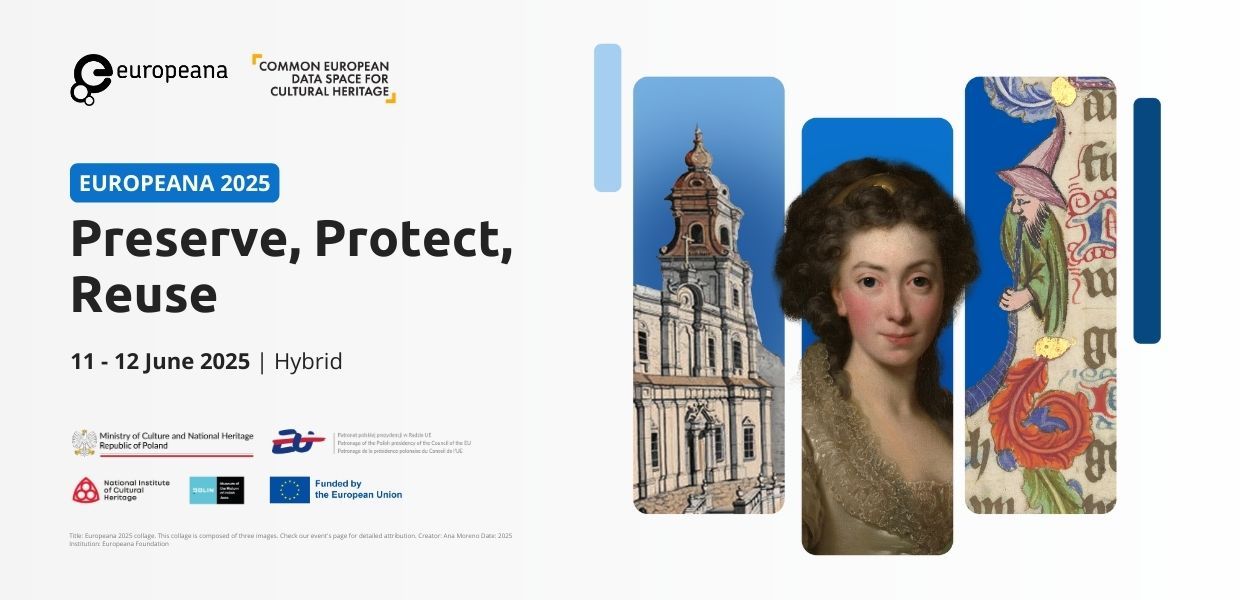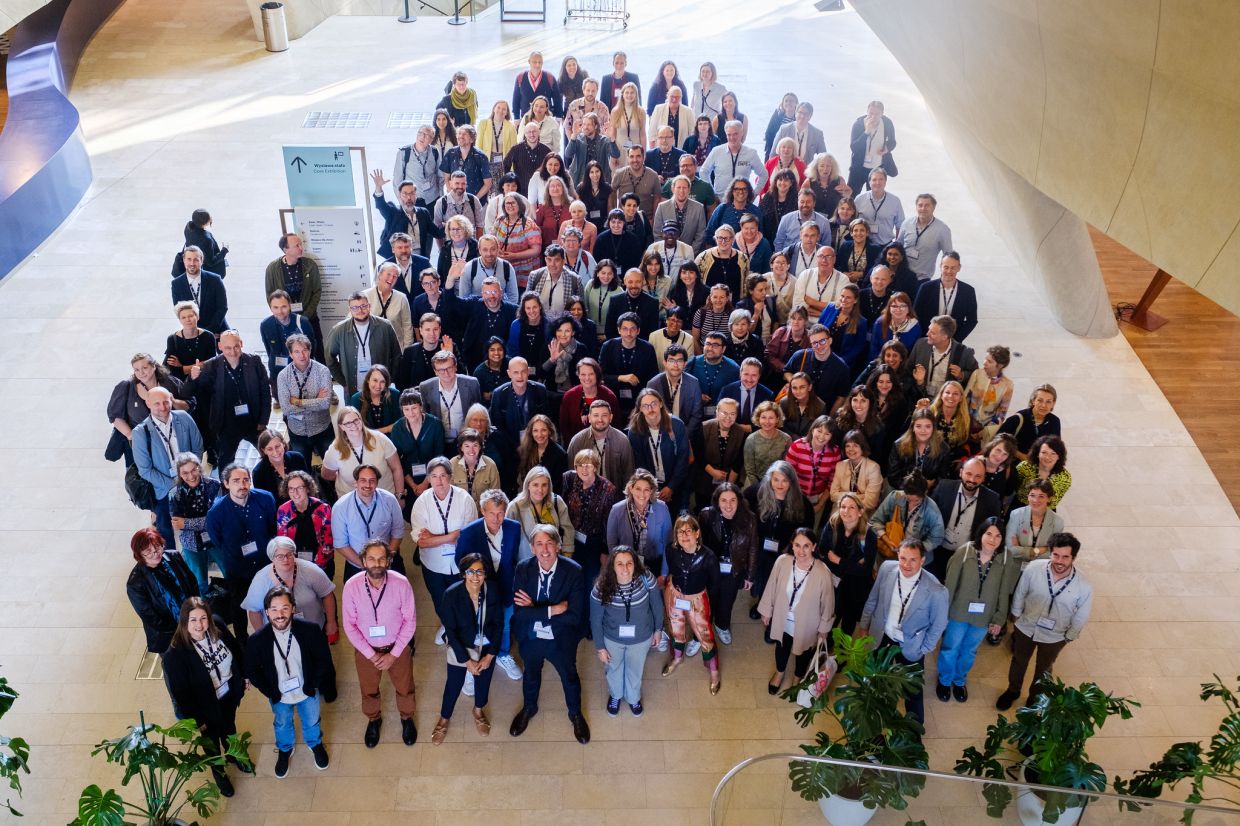The Europeana conference is a leading event in the world of digital cultural heritage and a flagship of the common European data space for cultural heritage. We are honoured that this year’s edition - Europeana 2025 - Preserve, Protect, Reuse - was co-organised in collaboration with the Ministry of Culture and National Heritage of Poland, the National Institute of Cultural Heritage and the POLIN Museum of the History of Polish Jews. It took place under the patronage of the Polish Presidency of the Council of the EU, in the vibrant Polish capital Warsaw,
Over 600 people attended Europeana 2025, including 275 in person in the award-winning POLIN Museum of the History of Polish Jews. We welcomed in person participants from over 33 countries, and people joined us online from 65 countries. The conference offered 36 sessions packed with 62 presentations, workshops, projects and talks, led by a fantastic line-up of 113 speakers.
The programme touched on some of the biggest issues shaping our sector and the common European data space for cultural heritage, from cybersecurity to the complex choices around adopting AI. It was clear: the work we’re doing matters.
What were some standout moments?
Inspiring keynotes
Europeana 2025 saw three inspiring keynotes from experts in the digital cultural heritage field.
Beginning with ‘Opening up the data space,’ Anne-Sophie Panzer and Stefan Marx of ZAUBAR explored how access to cultural heritage data fuels reuse, innovative storytelling and immersive experiences in the data space. This set the stage for the keynote, ‘The Time Machine effect: innovation through cultural heritage data’, by Dr. Julia Noordegraaf, who powerfully illustrated how leveraging historical data can drive innovation across research, education and public engagement. Finally, Brigitte Aga, Head of Innovation and Research at the MUNCH Museum, highlighted how artificial intelligence can be thoughtfully applied to enrich cultural interpretation and unlock new narratives in her keynote ‘Demystifying AI and unlocking the power of cultural heritage data.’
The keynotes emphasised the transformative potential of open data and emerging technologies in the data space - and the opportunities they offer for the preservation, protection and reuse of digital cultural heritage.
Twin it! Part II
We were delighted that at Europeana 2025, Rehana Schwinninger-Ladak, Head of Unit, Interactive technologies, Digital for Culture and Education, DG CNECT, European Commission, announced the launch of Twin it! 3D for Europe’s culture Part II. This second phase of the 3D digitisation campaign aims to scale up the 3D capture and preservation of Europe’s cultural heritage by further supporting EU Member States in their 3D digitisation and preservation efforts — now with a sharper focus on how the digitised assets will be used.
The announcement gave renewed energy to the many workshops, keynotes, panels and lighting talks focusing on 3D and digital cultural heritage at the conference.
Artificial intelligence in the spotlight
The opportunities and challenges AI presents for the cultural heritage sector were front and centre at Europeana 2025. Sessions showcased AI-powered tools designed to broaden access and engagement, while panels delved into immersive storytelling using XR, 3D and AI. Ethical considerations were prominent, with discussions on data transparency, cultural representation and copyright challenges in the age of AI. Workshops equipped participants with practical skills for responsible AI use, and keynotes emphasised the potential of AI to unlock the value of cultural heritage data.
The programme reflected a strong commitment to aligning technological innovation with cultural values and inclusivity, and also spotlighted how attendees can share their vision for the use of AI in the cultural heritage sector through the recently launched AI Alignment Assembly. Europeana also announced our upcoming collaboration with AI4LAM, a network focused on transparent, human-centric AI. Together, we commit to accelerate and advocate for responsible AI in culture.
Heritage at risk and cybersecurity
Europeana 2025 included a high-level Policy Forum dedicated to ‘Preserving cultural heritage: Protecting heritage at risk and enhancing cybersecurity.’ Policymakers from national governments and the European Commission joined the Forum to offer unique insights into the challenges faced across the continent, tackling a topic that’s fast becoming critical: protecting cultural heritage from digital threats. Highlights included a keynote from Liz Jolly (British Library), a powerful interview with Anastasia Bondar (Deputy Minister, Ukraine), and a thought-provoking roundtable. The session ended with a call to action that we look forward to sharing soon!
Strong collaboration with our Polish partners
Over the past year, we’ve been working closely together with our partners at the Ministry of Culture and National Heritage of Poland, the National Institute of Cultural Heritage and the POLIN Museum of the History of Polish Jews in Warsaw to shape the Europeana 2025 programme.
We were honoured to count with the personal contribution of high level representatives from our co-organising partners, including Sławomir Rogowski and Marta Cienkowska, Undersecretaries of State at the Ministry of Culture and National Heritage, POLIN Museum director Zygmunt Stępiński and Marlena Happach, Director of the National Institute of Cultural Heritage. We were also delighted to see a strong attendance from many other Polish participants and speakers.This engaging and thought-provoking conference would not have been possible without the continued support and inspiring input of all partners, and we look forward to future opportunities for collaboration and cooperation in the future.
Unsung heroes
At Europeana 2025 we were delighted to recognise four colleagues with the Europeana Unsung Heroes Award, given to members of our ecosystem who work tirelessly for Europeana, digital cultural heritage and the data space. This year, we were delighted to award Valentina Bachi, Altheo Valentini, Aleksandra Nowak and Nienke van Schaverbeke for their work with communities, data aggregation and advancing the reuse of digital cultural heritage throughout Europe.
Relive the event
We would like to say thank you to our partners, as well as all who attended and supported the conference!



